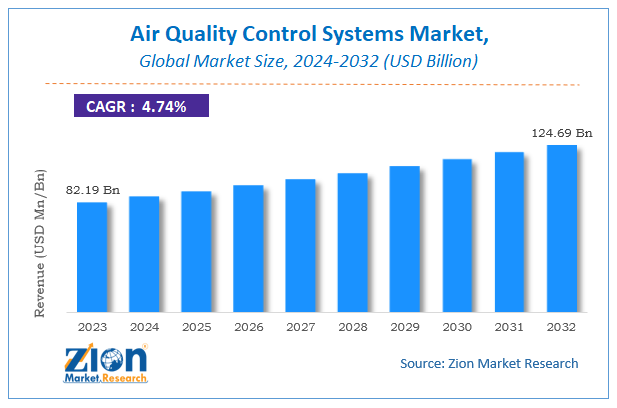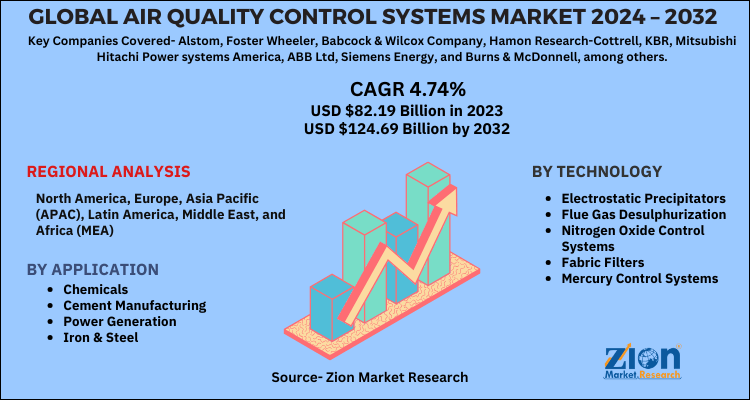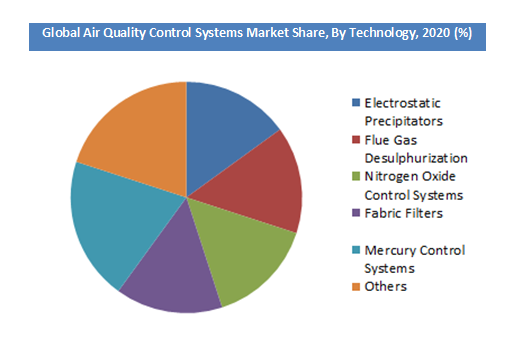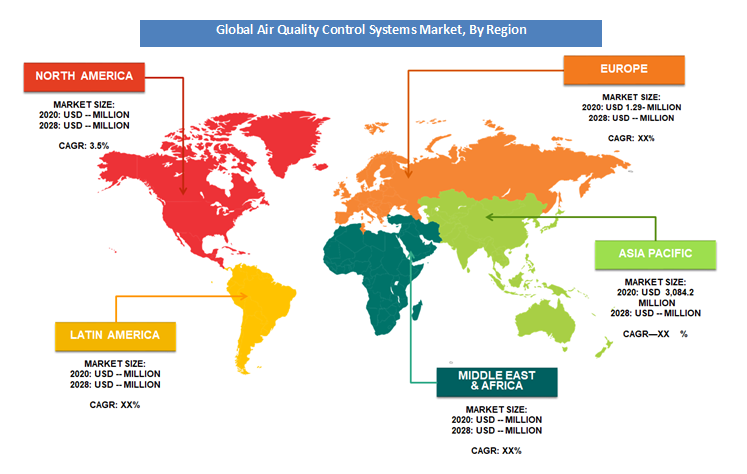Air Quality Control Systems Market Size, Share, Analysis, Trends, Growth, 2032

Air Quality Control Systems Market By Technology (Electrostatic Precipitators, Flue Gas Desulphurization, Nitrogen Oxide Control Systems, Fabric Filters, Mercury Control Systems, and others) By Application (Chemicals, Cement Manufacturing, Power Generation, and Iron & Steel): Global Industry Perspective, Comprehensive Analysis and Forecast, 2024-2032
| Market Size in 2023 | Market Forecast in 2032 | CAGR (in %) | Base Year |
|---|---|---|---|
| USD 82.19 Billion | USD 124.69 Billion | 4.74% | 2023 |
Air Quality Control Systems Market Insights
Zion Market Research has published a report on the global Air Quality Control Systems Market, estimating its value at USD 82.19 Billion in 2023, with projections indicating that it will reach USD 124.69 Billion by 2032. The market is expected to expand at a compound annual growth rate (CAGR) of 4.74% over the forecast period 2024-2032. The report explores the factors fueling market growth, the hitches that could hamper this expansion, and the opportunities that may arise in the Air Quality Control Systems Market industry. Additionally, it offers a detailed analysis of how these elements will affect market demand dynamics and market performance throughout the forecast period.
Air Quality Control Systems Market: Overview
Air quality control systems reduce the harmful contaminants in the air. The pollutants from manufacturing industries such as power generation plants, automotive, mining, medical, and pharmaceutical are reduced. Thus, air quality control systems offer solutions for controlling and handling of air, gases, and contaminants to provide cleaner air discharge.
The main systems available in the air quality control systems market are electrostatic precipitators, nitrogen oxide control systems, mercury control systems, Flue gas desulphurization, and fabric filters.
The players in the industry are focusing aggressively on innovation, as well as on including advanced technologies in their existing products. Over the coming years, they are also expected to take up partnerships and mergers and acquisitions as their key strategy for business development states the air quality control systems market study.
Air Quality Control Systems Market: Growth Factors
Rising renewable energy trends along with an unfavorable economic environment, however, are predicted to impede air quality control systems market progression over the ensuing years. Nevertheless, the industry is forecast to display a robust development in the coming years subject to high awareness among the customers regarding controlling air pollution and the launching of new pollution controlling systems. This will help in normalizing the impact of hindrances on the air quality control systems market, reports the air quality control systems market study.
“Implementation of strict legislations related to nitrogen oxide and mercury emissions in the atmosphere is anticipated to spur the demand for air quality control systems in the near future,” says the author of this study. Escalating the need for controlling the levels of air pollution in cement manufacturing, metal processing, power generation, and chemicals is likely to impel the air quality control systems market growth over the coming years.
Air Quality Control Systems Market: Report Scope
| Report Attributes | Report Details |
|---|---|
| Report Name | Air Quality Control Systems Market |
| Market Size in 2023 | USD 82.19 Billion |
| Market Forecast in 2032 | USD 124.69 Billion |
| Growth Rate | CAGR of 4.74% |
| Number of Pages | 160 |
| Key Companies Covered | Alstom, Foster Wheeler, Babcock & Wilcox Company, Hamon Research-Cottrell, KBR, Mitsubishi Hitachi Power systems America, ABB Ltd, Siemens Energy, and Burns & McDonnell, among others. |
| Segments Covered | By Technology, By Applications and By Region |
| Regions Covered | North America, Europe, Asia Pacific (APAC), Latin America, Middle East, and Africa (MEA) |
| Base Year | 2023 |
| Historical Year | 2018 - 2022 |
| Forecast Year | 2024 - 2032 |
| Customization Scope | Avail customized purchase options to meet your exact research needs. Request For Customization |
Air Quality Control Systems Market: Segmenatation
Segment Analysis Preview
Based on technology, the market is segmented into Electrostatic Precipitators, Flue Gas Desulphurization (FGD), Nitrogen Oxide Control Systems, Fabric Filters, Mercury Control Systems, and Others. The fabric Filters segment is likely to remain dominant throughout the forecast period.
Based on technology, the market is segmented into Chemicals, Cement Manufacturing, Power Generation, Iron & Steel, and Other Applications.
The air quality control system market is segmented by technology and applications.
Air Quality Control Systems Market: Key Players & Competitive Landscape
The report covers a detailed competitive outlook including the market share and company profiles of the key participants operating in the global air quality control system market
- Alstom
- Foster Wheeler
- Babcock & Wilcox Company
- Hamon Research-Cottrell
- KBR
- Mitsubishi Hitachi Power systems America
- ABB Ltd
- Siemens Energy
- Burns & McDonnell
- among others.
The global Air Quality Control Systems Market is segmented as follows:
By Technology
- Electrostatic Precipitators
- Flue Gas Desulphurization
- Nitrogen Oxide Control Systems
- Fabric Filters
- Mercury Control Systems
- Others
By Applications
- Chemicals
- Cement Manufacturing
- Power Generation
- Iron & Steel
- Others
By Region
- North America
- The U.S.
- Canada
- Europe
- France
- The UK
- Spain
- Germany
- Italy
- Rest of Europe
- Asia Pacific
- China
- Japan
- India
- South Korea
- Southeast Asia
- Rest of Asia Pacific
- Latin America
- Brazil
- Mexico
- Rest of Latin America
- Middle East & Africa
- GCC
- South Africa
- Rest of the Middle East & Africa
Table Of Content
Methodology
RelatedNews
HappyClients
Zion Market Research
Tel: +1 (302) 444-0166
USA/Canada Toll Free No.+1 (855) 465-4651
3rd Floor,
Mrunal Paradise, Opp Maharaja Hotel,
Pimple Gurav, Pune 411061,
Maharashtra, India
Phone No +91 7768 006 007, +91 7768 006 008
US OFFICE NO +1 (302) 444-0166
US/CAN TOLL FREE +1 (855) 465-4651
Email: sales@zionmarketresearch.com
We have secured system to process your transaction.
Our support available to help you 24 hours a day, five days a week.
Monday - Friday: 9AM - 6PM
Saturday - Sunday: Closed








